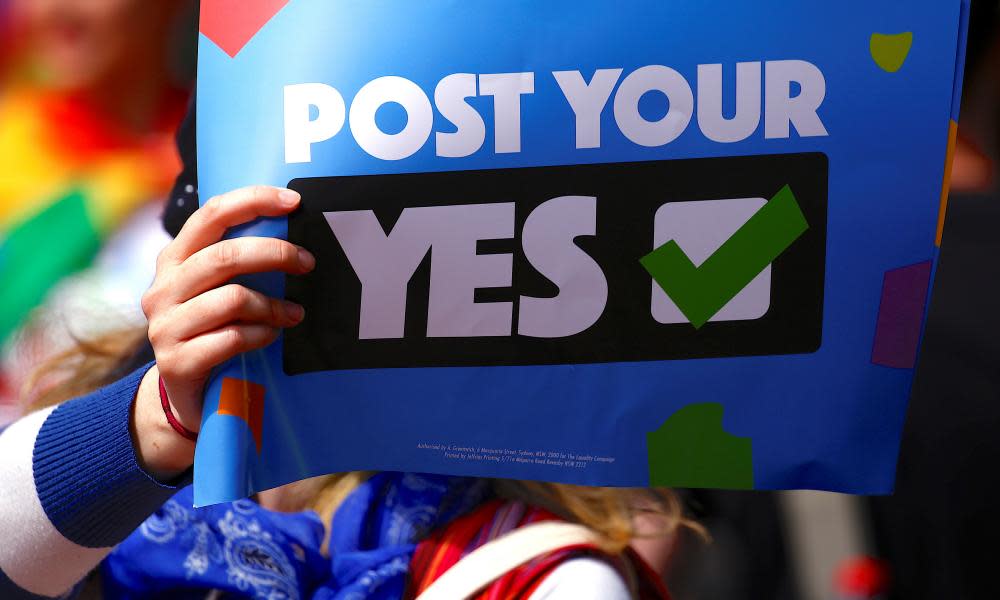Sixty per cent of postal survey voters have said yes to marriage equality – Guardian Essential poll

More than half of people who have returned their ballot in the same-sex marriage postal survey say they have voted in favour of marriage equality, according to the latest Guardian Essential poll.
The new survey of 1,859 voters records 60% saying they have voted yes, which is down 4% from the last time the question was asked three weeks ago, and 34% saying they have voted no, which is up 4% in the same timeframe.
Before new postal survey participation estimates from the Australian Bureau of Statistics expected on Tuesday, 75% of the Guardian Essential sample reports that they have already voted in the ballot, and 8% say they will definitely vote.
The high level of participation compares with 47% reporting they had already voted three weeks ago, and 33% suggesting they would definitely vote.
The new poll suggests older people have higher participation rates in the survey than younger people, with 91% of people aged over 55 reporting they have already voted compared with 60% of people aged under 35.
Of the people who have not yet voted in the survey, 39% are intending to vote yes and 33% say they will vote no. Of people reporting they will definitely vote, 64% say they will vote yes and 31% no.
The postal vote is now in its closing stages, with voters encouraged to return their forms by 27 October. The survey closes on 7 November.
While the trend looks positive for the yes campaign across a range of published opinion polls, debate is still simmering in Canberra about protections for religious freedom in the event the country votes yes.
Labor has already endorsed the cross-party marriage equality bill produced by the Liberal senator Dean Smith after a Senate committee inquiry, in effect ruling out any further protections for religious freedoms beyond the ability of religious ministers, celebrants and organisations to refuse to conduct weddings.
But conservatives are working on an alternative marriage bill with more broad-ranging protections, and the former prime minister John Howard has warned there will not be enough time to protect religious freedom after the result is known.
With energy policy the dominant issue in Australian politics over the past week, voters were also asked in the latest Guardian Essential survey to share their views about the Turnbull government’s new national energy guarantee.
With detail about the scheme still scarce, most people are still on the fence, with nearly half (47%) unable to give an opinion. Thirty-five per cent approved of the plan and 18% disapproved.
The sample was also split over the government’s decision to dump the chief scientist Alan Finkel’s proposal for a clean energy target and replace it with new reliability and emissions reductions obligations on electricity retailers, with 35% approving of the shift, and 32% disapproving.
Voters were more attentive to the lack of ongoing subsidies for renewable energy, with 41% disapproving of the government’s decision to end subsidies once the renewable energy target peaks in 2020, and 32% approving.
They are also highly sceptical about claims the national energy guarantee will lower power bills.
The Energy Security Board says wholesale prices are expected to decline by 20% to 25% a year between 2020 and 2030 under the proposal, and residential bills will go down “in the order of” $100 to $115 a year over the same period.
But voters aren’t buying it. Only 16% think the plan will reduce power prices, while 31% think the plan will increase prices and 31% think it will make no difference.
Voters were also asked about who they trusted more in handling Australia’s energy policy challenges, with more than half the sample thinking there is no difference between the political parties or not having strong views about who is more competent.
Despite a number of high-profile interventions on energy over recent months by the Turnbull government, including interventions on gas supply and with energy retailers – Labor was more trusted to reduce carbon emissions, invest in renewables, stand up to the power companies and develop a modern power grid.
There was no significant difference in preference for either party on reducing power prices or ensuring a reliable power supply.
The latest poll has Labor retaining its election-winning lead over the Coalition, with the opposition ahead of the Coalition on the two-party-preferred measure, 52% to 48%, which is the same result as last week.

 Yahoo News
Yahoo News 
